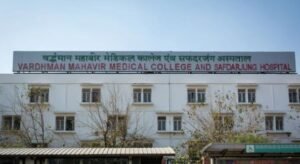In March of this year, a significant scandal came to light at Safdarjung Hospital as the Central Bureau of Investigation (CBI) took action against a prominent neurosurgeon and four accomplices. They were accused of pressuring patients into buying surgical equipment from a specific establishment at excessively high prices. This alleged criminal network exploited vulnerable patients for financial gain, extorting money under the guise of medical treatment. In a recent development, the CBI filed a fresh case against the neurosurgeon and his wife, revealing their suspected involvement in amassing disproportionate assets.

The new First Information Report (FIR) provided astonishing details about the alleged wealth accumulation of the couple. The neurosurgeon, during the CBI’s inquiry, was found to have acquired assets worth a staggering ₹ 4.63 crore. These assets comprised five immovable properties located in Noida (Uttar Pradesh) and Haldwani (Uttarakhand), collectively valued at ₹ 3.47 crore. Additionally, he invested approximately ₹ 48 lakh in companies and firms where his wife served as a director or partner. Moreover, he allocated ₹ 17.5 lakh towards insurance policies. The FIR explicitly accused the neurosurgeon of knowingly and unlawfully amassing financial gains, aggregating assets worth ₹ 2.40 crore under both his and his wife’s names. This sum represented a striking 70.85% increase over their known sources of income.
The unfolding case came to public attention in March when the Central Bureau of Investigation launched an investigation into an alleged extortion racket involving the neurosurgeon and his associates. The doctor, in an attempt to cover up a fatal accident that occurred in Ghaziabad in 2017, purportedly presented another individual as the driver during the incident. Subsequent investigations refuted this claim, revealing the man to be a truck driver in Bareilly at the time of the accident. This revelation added further momentum to the ongoing investigation, uncovering what appeared to be a complex criminal enterprise involving the neurosurgeon and his associates.
The CBI’s findings pointed to a well-organized criminal conspiracy, where the neurosurgeon and his associates allegedly exploited the trust of patients seeking medical treatment. Patients were allegedly coerced into purchasing surgical equipment at inflated prices from a specific establishment, with the doctor allegedly receiving kickbacks for each transaction. Moreover, the doctor’s associates purportedly played a significant role in this operation, contacting patients’ attendants and offering preferential treatment or earlier surgery dates in exchange for bribes. The funds obtained through these questionable practices were then channeled into various bank accounts to obscure their origins, posing a considerable challenge to the investigating authorities.
As a result of the extensive investigation, the CBI promptly arrested the neurosurgeon, his wife, and other members of the suspected criminal network. The arrests were conducted during raids at Safdarjung Hospital and various locations in Uttar Pradesh. The case reverberated throughout the medical community and the general public, underscoring the urgent need for enhanced oversight and accountability to protect patients from such exploitative practices.













